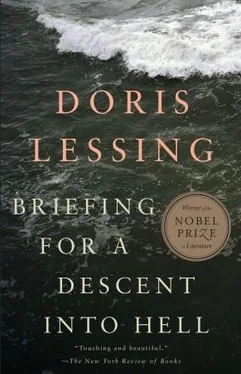In short, that Victorian crisis was over. Frederick was left with two thoughts. One, that this frightful, painful, and very real conflict had taken place about a hundred years ago, which was nothing at all, even in human time. It had been a very common conflict indeed. Some of the best Victorian minds had suffered torment, even collapse. Careers had been ruined, families destroyed, lives laid waste. But by even a few decades later these Doubts looked ludicrous. (In religious terms, Doubts looked ludicrous, for in our time Crises of Doubt are experienced most noticeably in the political context.) The second thought was — that his state of mind after the African visit, his state of mind due to visiting the Turkey site, were identical with that of the Victorian clergyman in his religious conflict. But the Victorian had not had the benefit of modern psychology. (Though he could have remembered that the hand of the dyer is subdued to his craft.) There was, however, no excuse at all for him, Frederick, not to take a cool look at what was bothering him, which was nothing less, unfortunately, than Profound Doubts about what was going on in Archeology, Doubts about its bases, premises, methods and above all, its unconscious biases.
If he were to do what that poor Victorian had done, he should accept the job in the Sudan, on the grounds that if he did not, his wife would have to go without a pleasure cruise to Madeira, on which she had set her heart, and it was not fair to make her suffer for his crisis of confidence. But if he did this, since the Mind of the Worker is conditioned by his Work, he would have soon forgotten all about his Doubts, which would begin to look silly and unhealthy. Luckily Frederick’s wife is a sensible woman whose attitude towards archeology has always tended to be that it made for attractive holidays for herself and the children, and all she said to Frederick was that she could hardly complain about not going to Madeira when she had been able to get about so much. She went off to stay with a friend in Spain who has a villa, leaving Frederick in London.
And now for an interesting psychological fact … in an account which I hope you’ll agree is not short of them. Frederick forgot all about his Doubts that resulted from the African visit — this is not surprising since it happened a decade ago. But he also forgot his Doubts of last year after the Turkey excavations. Forgot completely, until just recently, after his visit to Wiltshire, when he made a deliberate effort to remember things he might have buried because they were painful. He then slid into a Euphoric, or Male Menopausal, or Manic Depressive (pay your penny and take your choice!) state of mind which he enjoyed enormously. If enjoyment is the word for such a bonus. He walked about London, and amused himself by going to museums and looking at pots and spears and stones and things and inventing theories as powerful and as convincing as currently accepted ones, about previous societies. And so now I’ve reached the end of what I agreed to write and tell you. If what I have said doesn’t mean anything to you, then I have made a mistake, but I do find that hard to believe. I don’t know why it is, but I am sure you will understand. Would you like to come and see me next time you are in London? I would be delighted, and so would Frederick and the others.
Incidentally, about Frederick’s stammer, in case this is of any use to you, he has cured it by letting the “parallel stream” of ideas, or words, that inhibited him from saying the usual things, come out: he listens and then voices it. Aloud. Either to himself, into a tape recorder, or to me. The results are surprising.…
I do look forward to hearing from you,
Sincerely yours,
ROSEMARY BAINES
DEAR MISS BAINES,
I don’t know when I have felt so flattered. What a large result from what I am afraid I have to tell you was nothing but a routine occurrence for me. For my sins I give quite a number of lectures outside my own field. My wife says that I have too much energy for my own good. Perhaps she is right. The remarks which struck you so disproportionately — if I may be so frank! — I am afraid are one of my stock ploys. When I run dry or run out of breath, I have a few old standbys to get me started again. Yes of course I do feel that education is not what it ought to be. But few of us do not. I suppose I have to admit that what was once a crusade, a bit of a bee in the bonnet, has cooled rather. As regards your kind remarks about stammering, I am extremely grateful, of course. I have recently been overworking, or so the doctor tells me, and I developed a tendency to stammer. But I don’t seem to remember doing so at that lecture. But you appear to remember it all in such very remarkable detail. Perhaps my making a joke about stammering had a prophylactic effect? I have found this to be the case. As regards Frederick Larson, I do seem to know the name, but that is all. I take his word for it that we have met. I think he is making too much of the stammering. Mine was relieved by remembering to speak very slowly and carefully, particularly when tired, and above all, by not forgetting to take the doctor’s pills. I am sorry I have to disappoint you in replying so churlishly to your quite extraordinarily lengthy letter. But alas, I have not yet retired, with my time to myself. Which must be my excuse for not accepting your extraordinarily kind invitation to meet you and Mr. Larson. I am very seldom in London and when I am my time is taken up with interviews and visits in connection with my work.
Yours truly,
CHARLES WATKINS
DEAR DOCTOR Y,
Professor Watkins came to consult me in the spring of this year, in connection with stammering. I prescribed Librium and a holiday. I also gave him the address of a speech therapist, when the stammering did not stop. He has been on my books for five years. I took this practice over in 1964. He has not been ill in that time, except for influenza last year. He seemed to me to be in pretty good physical shape in March. He said he had lost weight. When I got your letter I asked his wife to come in and see me. I know her rather better than I know him, because I attend the children. She doesn’t seem able to throw much light. But in her interests, I suggest she see her husband pretty soon. Of course I am only that old-fashioned thing, a family doctor, and I don’t know as much as I should about mental health. But Mrs. Watkins is under heavy strain.
Yours sincerely,
DOCTOR Z
Hello Charles.
You are …
I’m your wife .
Would you like to sit down?…………………………………….
…………………………………………………………………………..
I’m sorry, I don’t know what to say.
But Charles it isn’t possible that you don’t know me?
I’m sorry.
But I just can’t …
Then Felicity …
How do you know my name is Felicity?
They told me. They said you might come today.
You didn’t ask to see me then?
No………………………………….
Charles you sit there and you tell me … oh, no, I just can’t believe it. Oh, I’m so sorry.
Tell me then?
Tell you what?
For instance, how long have we been married?
Fifteen years.
……………………………………………………………………
………………………………………………………………………
The doctor says he has had other cases. I’m not the first, by a long chalk. Why are you laughing?
You always say that, just like that, “by a long chalk.”
Do I?………………………………………………………………
………………………………………………………………………
When they told me you were coming, I hoped that if I saw you I’d remember …
Читать дальше
Конец ознакомительного отрывка
Купить книгу










